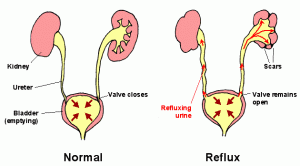What is reflux nephropathy?
Reflux – is when urine goes back up the wrong way from the bladder towards the kidney, while the bladder is emptying
Nephropathy – means kidney damage. In reflux nephropathy there is a particular type of scarring which can be seen on some types of X-ray.
Reflux nephropathy has sometimes been called chronic pyelonephritis in the past.
What trouble does it cause?
Some people are completely unaware that they have it. Others have major trouble from infections or from the kidney damage that can go with reflux.
Infections: Urine infections are more common in people with reflux, and it used to be thought that this was the major cause of kidney damage in the disease. However modern ultrasound imaging has shown that damage is often present even before birth, when there cannot be any infection. Some people with reflux nephropathy are unaware of ever having had any urine infections.
In early childhood, severe infections may worsen kidney damage, although after the age of 5 years this seems to happen only very rarely.
Kidney damage: The pattern of the scars in some kidneys affected by reflux suggests that reflux causes the damage. If so, this probably occurs very early in life, and possibly before birth. It is not always certain that reflux has caused kidney damage though – there may be another cause
What causes reflux?
Reflux is almost always a problem you are born with. There is a strong tendency for it to run in some families, and the genetics of this is the subject of research.
Some people with reflux nephropathy may have other abnormalities within the kidney or lower down – for example, the kidneys themselves may not have developed normally, or there may be narrowing or blockage of the normal urine flow (for example, caused by urethral valves).
How is it diagnosed?
In childhood, or sometimes later, reflux nephropathy may be recognised because of investigations into urine infections.
Sometimes it is picked up in adults or children after discovery of proteinuria, or high blood pressure, or abnormal kidney function.
Using tests like this, reflux can be detected and graded from very mild to severe.
Will an operation to correct the reflux help?
An operation to reimplant the ureters used to be carried out quite often to do this. However the long-term results of these operations show that although the reflux is cured, it doesn’t make much difference to kidney damage. This must be either because the kidney damage isn’t caused by reflux, or because the damage was already done before the operation.
There may be exceptions, for example if there are repeated infections in the kidney (pyelonephritis). Other treatments to prevent reflux (eg injections where the ureter enters the bladder) are also being tried, but again, may not make much difference in the long run.
In most children, reflux reduces greatly with time, even if you do nothing.
Pregnancy
Anyone with kidney disease may have extra problems in pregnancy, and should (if possible) discuss things before becoming pregnant. Because reflux nephropathy commonly affects young people, this is quite a common question. See information on pregnancy and contraception in renal disease.
Will I always need to take antibiotics?
Not necessarily. New kidney scars usually form only in early childhood, and it has not been proven that taking antibiotics later on has any influence on kidney damage. However some people continue to get many troublesome urine infections, and they may be helped by antibiotics to prevent these.
What treatment is there?
Treatment for reflux nephropathy falls into several areas.
If urine infection is troublesome, the usual measures for prevention are usually helpful. Further information
High blood pressure should be treated to protect the kidney from further damage. Further information
If kidney function is reduced, other things may be necessary. Further information
Operations to cure the reflux itself are rarely undertaken now. Occasionally a severely diseased kidney that is not working may be removed to help blood pressure control, or possibly to reduce recurrent infections.
Further information
Elsewhere on EdREN you can find information on the following:
- Urine infections
- High blood pressure and kidney disease
- Chronic renal failure and its progression
Information from elsewhere:
- Reflux nephropathy from the NKF (UK).
- Information for doctors, medical students and healthcare workers
- See the section on reflux nephropathy in teaching information on UTI and related conditions within the EdREN Education section.
Acknowledgements: The author of this page was Neil Turner. It was first published in August 2001. The date is was last modified is shown in the footer.

